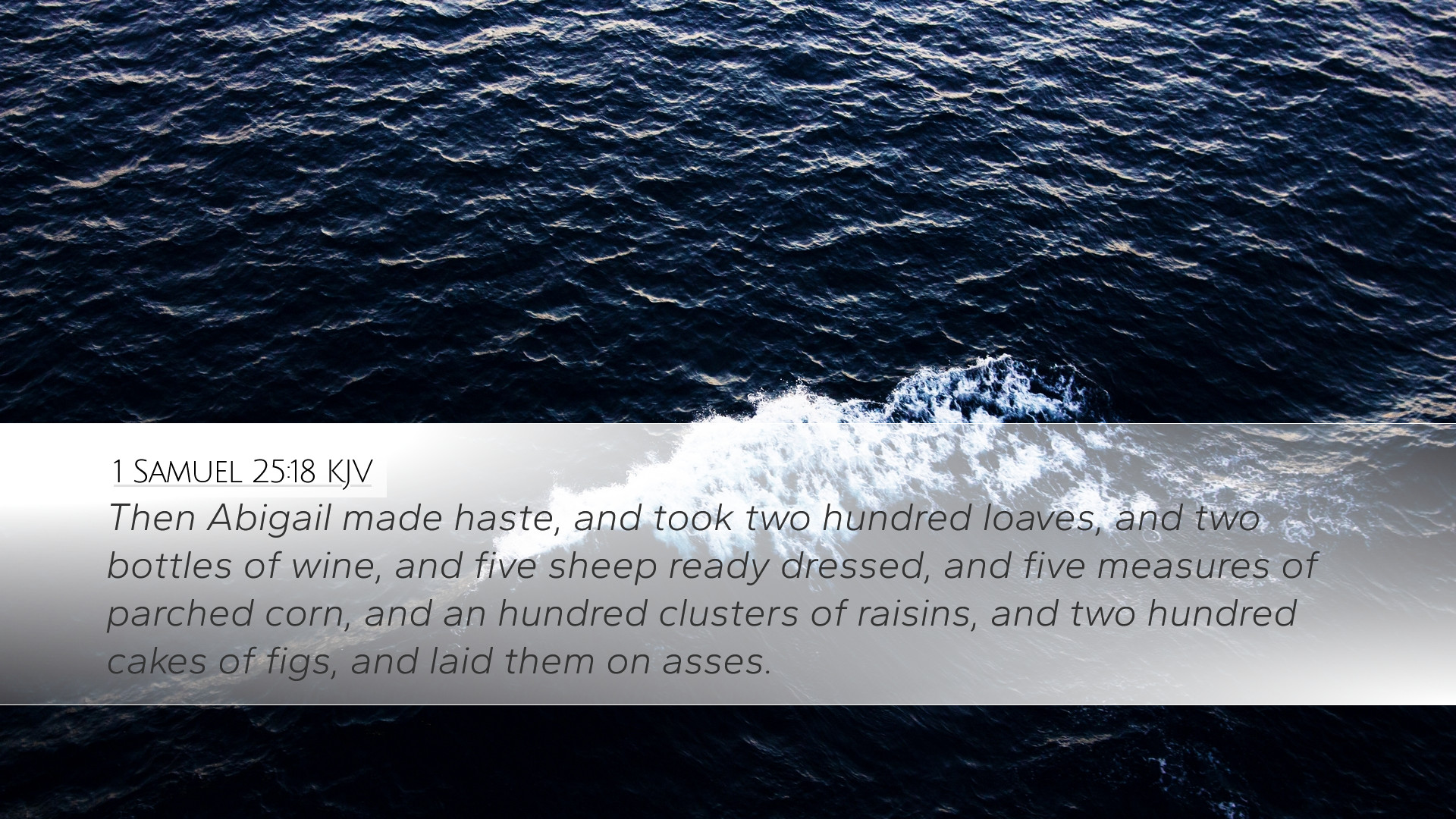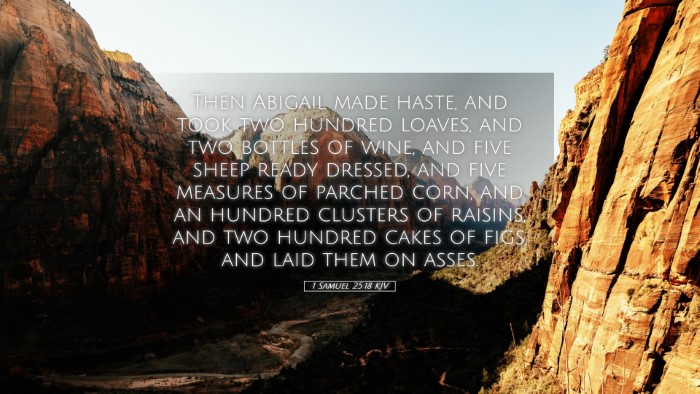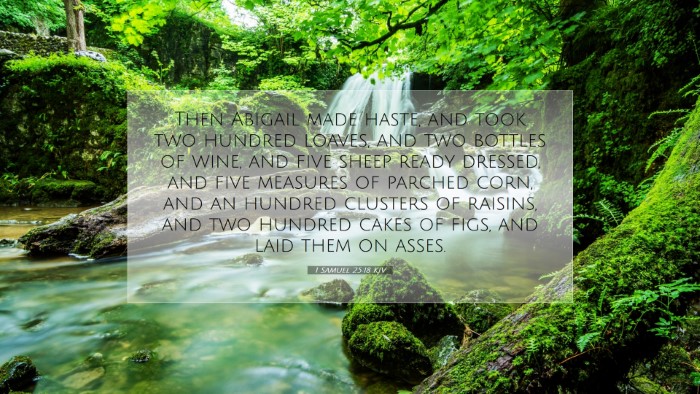Commentary on 1 Samuel 25:18
Verse Context: 1 Samuel 25:18 states, "Then Abigail made haste, and took two hundred loaves, and two bottles of wine, and five sheep ready dressed, and five measures of parched corn, and a hundred clusters of raisins, and two hundred cakes of figs, and laid them on asses." This passage highlights the actions of Abigail, who is a central figure in this narrative, demonstrating her wisdom and intercessory role.
Introduction to Abigail
The character of Abigail is one of the most striking in the Bible. She is introduced in this chapter as the wife of Nabal, who is described as a churlish and harsh man. Abigail, in her wisdom, takes it upon herself to mitigate a potentially violent conflict. This action serves as not only a means of appeasing David but also reveals deeper themes of humility, wisdom, and proactive leadership.
Insights from Public Domain Commentaries
Matthew Henry's Commentary
Matthew Henry emphasizes Abigail's promptness and generosity: “She did not only hasten to meet David, but prepared her gifts in haste.” He reflects on the significance of her actions, noting that she took the initiative to pacify David in the face of her husband’s folly. Henry presents Abigail as a model of a wise woman, understanding that true leadership often involves self-sacrifice and the willingness to act decisively for the sake of peace.
Matthew Henry notes the variety of provisions Abigail prepared: “She took two hundred loaves, and two bottles of wine, and five sheep ready dressed.” This selection of gifts is observed as not just a gesture of appeasement but an acknowledgment of David’s dignity as a future king and his needs as a leader. The amount and diversity of the offerings reflect her thoughtful consideration of David’s needs and her desire to restore relations.
Albert Barnes' Commentary
Albert Barnes provides a detailed examination of the specifics of Abigail’s gifts. He explains that the items Abigail brought were not merely for sustenance but symbolized respect and honor toward David. Barnes points out, “The two hundred loaves and the parched corn suggest the abundance of resources Abigail had at her command.” He argues that her wealth and ability to be generous were not only remarkable but indicative of her social position which she wielded wisely to avert catastrophe.
Moreover, Barnes highlights the urgent terminology used in the text, illustrating Abigail's immediate and decisive action. “Made haste” conveys not merely speed, but urgency born out of necessity; Abigail recognized the serious threat posed by David after Nabal’s insult and acted without delay.
Adam Clarke's Commentary
Adam Clarke takes note of the cultural implications behind Abigail's gifts. He asserts that the provision of food and drink was considered a deeply respectful and hospitable act, especially in ancient Israelite culture. Clark notes, “To bring such a bounty to a future king like David was a way of acknowledging his future authority.”
Clarke further comments on the symbol of the different food items: “The sheep ready dressed represent preparation and readiness to serve; the wine denotes joy and celebration, and the cakes of figs and raisins perhaps symbolize sweetness and appreciation.” This cultural perspective adds additional layers to the understanding of why such gifts would be necessary and how they would be received by David.
Spiritual and Theological Reflections
This passage provides much for clergy and theologians to reflect upon regarding leadership, humility, and intercession. Abigail stands as a type of Christ in her willingness to engage in the matter of reconciliation. Her character illustrates the principle of taking responsibility for others' well-being, as seen in her willingness to confront her own family's recklessness and stepping forth to mediate with David.
Leadership Lessons from Abigail
- Proactive Initiative: Abigail did not passively wait for the situation to resolve; she acted swiftly to avert bloodshed.
- Wise Counsel: Her knowledge of David’s reputation as a future king enabled her to present her case effectively.
- Generosity and Hospitality: The gifts she brought showcased her generosity and understanding of the cultural significance of hospitality.
Application to Modern Ministry
Pastors and ministry leaders can draw valuable lessons from Abigail’s character. In moments of conflict, a leader must be equipped to act with both wisdom and compassion. Abigail’s preparation and foresight can serve as a model for churches facing disputes or challenges; leaders must respond with clarity, humility, and the readiness to restore relationships.
Conclusion
In summary, 1 Samuel 25:18 encapsulates Abigail's vital role in a tense narrative within which her wisdom shines as a beacon of hope amidst folly. Her quick thinking, generosity, and respect for God’s chosen leader show a profound understanding of her circumstances. For scholars and students of the Bible, Abigail's story serves as a reminder of the power of humility and the importance of addressing conflicts with grace and wisdom.


